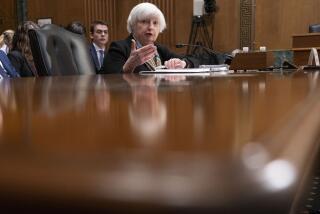Hedge Losses Called Low Risk to Banks : Finance: Regulators say that despite billions of dollars lost in market plunges, the high-risk funds pose no immediate threat.
- Share via
WASHINGTON — High-risk hedge funds, which suffered billions of dollars in losses during the recent stock and bond market plunges, pose no immediate threat to the health of the nation’s banking system or securities firms, federal regulators said Wednesday.
Bank exposure--either through investing in or lending to the funds--is very limited, said Comptroller of the Currency Eugene Ludwig and Federal Reserve Board Gov. John P. LaWare. Only eight national banks have any financial exposure to the funds, with loans or credits totaling $1.04 billion, Ludwig told a hearing of the House Banking Committee. He said he has stationed at those eight banks full-time staff members who track the banks’ level of risk and review market-related activities at least weekly.
If the regulators’ assertions are true, that’s good news for taxpayers, who would foot the bill for bank failures stemming from exposure to hedge fund losses.
But lawmakers and market experts nonetheless say the risks are high that individual companies, pension funds or mutual funds could report losses from the use of hedge funds and so-called derivatives. Those losses in turn could hurt individual investors and shareholders.
Despite the reassurances of the banking regulators that hedge funds are not a problem, House Banking Committee Chairman Henry B. Gonzalez (D-Tex.) said he is still worried about the potential for federally insured institutions to take big financial risks that could hurt their profitability.
Congress and the regulators must develop “supervisory strategies to control the risks,” he said.
Hedge funds--which operate privately without regulation and use borrowed money to speculate in stocks, bonds and currencies--aim for extraordinary profits.
They often make heavy use of derivatives--investment instruments derived from the prices of assets such as stocks, bonds, commodities or currencies. Derivatives provide an opportunity for big profits--or big losses--through the use of leverage, in which comparatively little money can control a much larger investment.
For example, Askin Capital Management, a New York firm with money from wealthy, private investors, was wiped out recently after losing $600 million trading in bonds backed by mortgages.
The fund apparently borrowed $2.50 for every dollar invested, and when the value of the assets declined rapidly, it was necessary to sell holdings at a loss to meet margin calls, Securities and Exchange Commission Chairman Arthur Levitt Jr. said. (Margin calls require that investors pay additional money to make up for the decreased value of stocks or bonds they acquired by borrowing.)
However, losses to broker dealers who provided funds “were not significant in relation to firm or industry capital,” he noted.
Levitt said he has asked the hedge funds to provide information on their owners, investments, borrowing and trading activities.
The Fed’s LaWare said the recent decline in stocks and bonds reflected more an easing of an overly hot market than a panic selloff. “It seems clear that the rumors of widespread margin calls by lenders to hedge funds were exaggerated,” he said.
The biggest hedge fund operator, international financier George Soros, told the committee that the recent market decline was “a healthy correction for the industry.” He said his $10-billion fund probably represents about 15% of the total hedge fund business. “There has been a boom in hedge funds, and with every boom there is a danger of excess,” Soros said.
He insisted that his fund makes comparatively little use of derivatives and instead trades directly in stocks, bonds and currencies.
More to Read
Inside the business of entertainment
The Wide Shot brings you news, analysis and insights on everything from streaming wars to production — and what it all means for the future.
You may occasionally receive promotional content from the Los Angeles Times.









